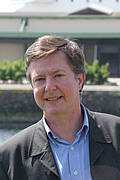Short Bio
 Olivier Lemaire completed his graduate studies at the University of Rouen where he obtained a law degree, a master’s degree in tropical geography and specialized higher education diploma (DESS) in planning.
Olivier Lemaire completed his graduate studies at the University of Rouen where he obtained a law degree, a master’s degree in tropical geography and specialized higher education diploma (DESS) in planning.
From 1985 to 1987, he was a researcher at ORSTOM in Quito (Ecuador) ane worked as a geographer specializing in urban issues. He then completed various missions as a geographer – planner at Datar (Delegation for Spatial Planning – France) before taking over the leadership of the International Association Cities and Ports in 1989 when is was founded. As director of IACP, Olivier Lemaire has participated in many missions in port cities around the world. He assured the development of the international network of the association and manages its annual program of activities. Until now 13 international conferences have been organized by IACP as well as numerous specialized seminars and study tours on all topics relating to port city issues.
Track Keynote Speech: The Smart Port City, a win win strategy for city-port developments
The last three decades have seen the appearance of spectacular changes in port cities as they face the increasing globalisation of trade and the economy: relocation of port functions and the generalisation of container transport, redevelopment of Port-City interfaces and waterfronts, renewed dialogue with the city’s inhabitants…
More recently, under the combined effects of economic, ecological and resource crises, port-cities have developed innovative new strategies. They have sought to ensure their own economic competitiveness in order to respond to the diverse demands formulated by local – and also national and global – political and economic players. Thus port-city territories have been progressively invested by new economic players in the domains of renewable energy production, tourism, environmental management, etc.
They have therefore quickly become highly complex spaces, where conflicts of use between city and port, tourism and industry, natural and built-up areas need to be settled. Today, the world ecological and climatic context brings yet another dimension to this structural and functional complexity already facing port-cities. It burdens them with new concerns. The strategies drawn up within the fragile Port-City “ecosystem” must be ever more demanding in terms of sustainable development. The efforts of the interested parties – private and public players and the city’s inhabitants – must be conducted in harmony in the collective interest of all. Through its search for greater organisational efficiency and by sharing the flows of value, energy, data and people, the ambitions of a Smart Port thus fall into line with those of a Smart City, giving birth to the Smart Port City!